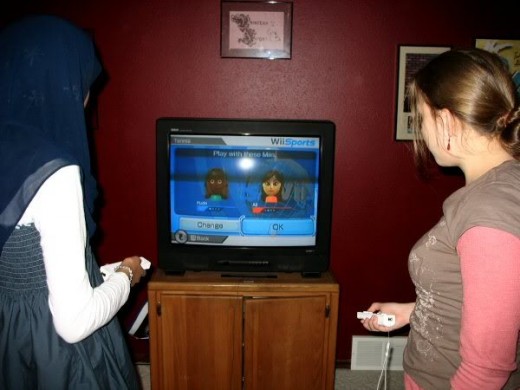Rethinking Video Games: Just a game, or an art?

Since Pong hit the arcades in the 1970s, video games have been held in negative public opinion, and their exploits met with dismissal as something for nerds and kids. Video games, non-gamers would say, were a childish hobby for the socially inept. The public couldn't understand the our attachment to fictional characters and worlds. When I was five years old, I received a Super Nintendo for Christmas along with Super Mario World, and from there, I spent a good portion of my childhood playing games. When I hit junior high school, playing video games was no longer publicly acceptable (especially not for a girl, though I think the boys were offered a grace period of another year or two to "grow out of it"), and I became a closeted gamer around my friends who preferred topics of celebrities, lip gloss and boys.
In the past decade or so, we have begun to see an extraordinary switch. Gaming has gradually clawed tooth and nail out of its stereotype and reached out to wider audiences. No longer was gaming reserved for computer nerds and children. Sports games and shooter games were marketed toward young men. The image of girls too being able to play games was beginning to be pushed in advertisements. Now, among more and more crowds, playing games is a normal leisure activity, and perhaps even something chic and trendy. That is where we are today. Society has conceded that video games might be okay sometimes in more types of people. But where can we go from there?
Video games are said to be more beautiful and expansive than ever. But I believe that the "beautiful" video game has existed for a long time. I have long been immersed in the stories of games, in the complexity and passions of their characters and depths of their worlds. I wonder, if we have call visual art and literature the trophy name "art", and we have allowed cinema and music to claim the same renown, then video games absolutely deserve to be considered an art, too.
What elements define art? Visuals. Narrative. Music. Some kind of story that portrays thoughts of feelings, perhaps. Video games have all of this, and one added element: personal interaction from the viewer, the ability to explore the art on his or her own, to participate in the conflicts the art presents, and ultimately come to the understanding of his or her choosing. Cinema might combine narrative, visuals and music, but the exploration is done entirely on the director's own terms. In a video game, the gamer commands the pieces and sees what results occur. More than that, video games are far bigger projects than movies, sometimes allowing over 40 hours from start to finish. Details that might normally be glossed over and ignored in a movie can be explored at the player's own discretion, making games a unique medium of art with endless possibilities.
Can video games really be beautifully engaging and emotionally moving? Yes, absolutely. Two of the highest-selling games of all time, and often voted best games ever - and two of my personal favorites - are The Legend of Zelda: The Ocarina of Time by Nintendo, and Final Fantasy VII by Squaresoft. Both 1990s games come from rich series where almost every installment could be strong evidence for video games as art, but here are perhaps the most popular and well remembered.

Ocarina of Time creates a beautiful and fantastical world with fairies, dragons, different races with individual cultures and gripping melodies. The story is simplistic, perhaps, the age-old tale of a protagonist who leaves everything he knows to save a world he knows little about. But the feelings of battle, victory and defeat are the genuine stuff of Renaissance paintings. When the controller is in your hands, you might swear that there is no ambrosia like leaping horseback across a broken bridge over a canyon, or the satisfaction at the mysterious warrior Shiek's revealing as the lost Princess Zelda. There was no feeling in the world like finally plunging your sword into the monstrous Ganon and liberating all of Hyrule. It is a visually-driven story that harnesses imagination, and ignites the adventurer in all of us that believes (if only when the controller is in hand) that we, too would fight to save the world.

Final Fantasy VII is an RPG (role-playing game) compared with Ocarina of Time's action-adventure. RPGs are typically story and character-driven, and Final Fantasy VII is often said to be the greatest RPG - if not the greatest game - ever made. It's a story of overcoming failure, of embracing dreams or facing reality, and of fighting for what's right even after losing everything. It's perhaps impossible to describe the story of Cloud Strife, a young man who believes he is something he isn't, exhaustively. Some themes in this game are subtle, some themes are more clear - the environment suffering on behalf of humans, standing up in the face of political injustice, and friendship (and love) withstanding through suffering. The tragic and sudden death of Aeris Gainsborough, a party member and love interest, has become one of the most iconic scenes of all time from a video game, as too the ambiguous ending that leaves the survival of humanity in question.

It is almost too easy to argue the merits of these titans that carved their way into gaming history back in the 1990s. Like the evolution of traditional art in the past two thousand years, technology has molded and morphed the visuals, from scenery to character designs, some stylized and artistic like 2006's IGN Game of the Year Ōkami, some breathtaking and eerily realistic like 2011's Bethesda visual magnum opus The Elder Scrolls: Skyrim. Video game music has not only sharpened in audio quality, but the effort put into composing orchestrated songs has become more serious. Video games, like art, are also increasingly responding to social issues, whether subtly or proudly. Bioware's acclaimed Dragon Age series has responded to topics like immigration and discrimination, and is one of the first and most famous games to allow gamers to create deep and meaningful gay romantic relationships. Games constantly explore issues like war, the environment, the role of religion, love and morality. And games these days aren't limited to action and fighting, either. There are countless games that tell stories without violence, for example, the Portal games tells its stories through puzzles.
Video games have made a lot of progress in social acceptance, and they continue to innovate, through flops and masterpieces, through the offensive and the brave, and push the technological limits. They deserve to be critiqued, admired, challenged and loved as art, something that gamers have understood for decades.








